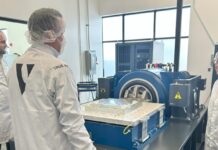Revolutionizing Cancer Diagnostics with Generative AI: Insights from Paige

Reading Time: 2 mins
Generative AI is set to bring transformative changes to the healthcare industry, particularly in cancer diagnostics, thanks to Paige. Paige is the pioneering company behind the first FDA-approved AI tool for cancer diagnosis. In a recent episode of NVIDIA’s AI Podcast, host Noah Kravitz delves into the subject with Paige cofounder and Chief Scientific Officer, Thomas Fuchs, who is also the Dean of Artificial Intelligence and Human Health at the Icahn School of Medicine at Mount Sinai.
Understanding Paige and Computational Pathology
The podcast begins by providing an overview of Paige and its groundbreaking work in computational pathology. Computational pathology leverages advanced algorithms and machine learning to analyze medical images, such as those from tissue biopsies, to detect and diagnose diseases more accurately and quickly than traditional methods.
AI Models and Visual Pattern Recognition in Cancer Detection
Fuchs explains how AI models use visual pattern recognition to accelerate cancer detection. By training algorithms on vast datasets of medical images, AI can identify patterns and anomalies that might be missed by human eyes. This capability is crucial in early cancer detection, where time and precision are of the essence.
Paige’s Success with AI in Cancer Imaging
The results Paige has achieved using AI in cancer imaging and pathology are promising. The AI tools developed by Paige have shown significant improvements in diagnostic accuracy and speed. This advancement not only enhances patient outcomes but also reduces the workload on pathologists, allowing them to focus on more complex cases.
Challenges in Cancer Detection
Despite these advancements, challenges remain in cancer detection. Fuchs discusses the hurdles faced in developing AI models, such as the need for large, high-quality datasets and the difficulty in generalizing AI models to work across different populations and medical institutions. However, ongoing research and collaboration aim to overcome these obstacles.
Fuchs’ Background and Contributions
Thomas Fuchs brings a unique perspective to the field, with a background in engineering at JPL (Jet Propulsion Laboratory) and NASA. His experience in these high-tech environments has significantly influenced his approach to applying AI in healthcare, driving innovation and precision in cancer diagnostics.
The Future of AI in the Medical Industry
Looking ahead, Fuchs envisions a future where AI plays an integral role in the medical industry. AI’s potential to improve diagnostic accuracy, personalize treatment plans, and enhance patient care is immense. The continuous evolution of AI technology promises to bring even more sophisticated tools and applications to healthcare.
Related Innovations in AI and Healthcare
For those interested in the broader implications of AI in healthcare, several other episodes of the AI Podcast provide valuable insights:
- Assistive Technology for the Visually Impaired: In episode 217, Dotlumen CEO Cornel Amariei discusses AI glasses designed to help people with visual impairments navigate the world. These glasses aim to enhance accessibility and independence for visually impaired individuals.
- Personalized Health with Viome: Episode 216 features Viome CTO Guru Banavar, who talks about AI-driven approaches to personalized health and wellness. Viome focuses on analyzing microbiomes and gene expression to provide tailored health recommendations.
- Revolutionizing Heart Health with AI: In episode 212, Dr. Keith Channon of Caristo Diagnostics explains how AI is used to detect coronary inflammation in cardiac CT scans. This technology helps improve treatment plans and risk predictions for heart disease.
Subscribe to the AI Podcast
To stay updated with the latest advancements and discussions in AI, subscribe to the AI Podcast. You can find it on various platforms, including iTunes, Amazon Music, Castbox, DoggCatcher, Overcast, PlayerFM, Pocket Casts, Podbay, PodBean, PodCruncher, PodKicker, Soundcloud, Spotify, Stitcher, and TuneIn.
—
Additional Insights and Reactions
The integration of AI in medical diagnostics is a game-changer for the healthcare industry. It brings a new level of precision and efficiency that was previously unattainable. The work done by Paige and other innovators in this field is a testament to the potential of AI to transform healthcare.
Experts in the medical community have expressed cautious optimism about these advancements. While the technology shows great promise, there is a consensus that it should be used to augment, not replace, human expertise. The collaboration between AI and healthcare professionals is key to maximizing the benefits and ensuring patient safety.
Moreover, the ethical considerations of AI in healthcare cannot be overlooked. Issues such as data privacy, algorithmic bias, and the transparency of AI decision-making processes are critical areas that need continuous attention and regulation.
For layman users, understanding the basics of how AI works in healthcare can be empowering. AI models are essentially trained on large datasets to recognize patterns. In the case of cancer diagnostics, this means feeding the AI thousands of medical images so it can learn to identify signs of cancer. The more data it processes, the more accurate it becomes. However, this also means that the quality and diversity of the data are crucial for the AI’s effectiveness.
In summary, the advancements in AI-driven cancer diagnostics by Paige and similar companies offer a glimpse into the future of healthcare. As technology continues to evolve, it holds the promise of not only improving diagnostic accuracy but also making healthcare more accessible and personalized. For patients and healthcare providers alike, these innovations represent a significant step forward in the fight against cancer and other diseases.
For more Information, Refer to this article.


































